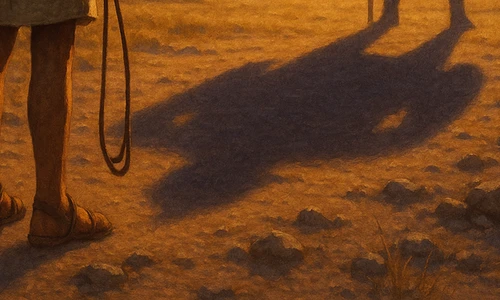There are two famous stories from the book of Daniel: the story of Daniel in the lions’ den; and the story of Shadrach, Meshach, and Abednego surviving the fiery furnace.
This article is about neither of those stories, but instead about the names of the men who star in them.
The four men have nearly identical backgrounds: Nebuchadnezzar conquers Jerusalem and deports some of its best and brightest youths to learn the language and culture of the Chaldeans. This tactic was common in the ancient world: the kidnapped scions served as effective hostages and, eventually, cultural ambassadors. They were respected by their native nation but raised among the elite of the invaders.
When Nebuchadnezzar captured Jerusalem, four of the deported young, intelligent, attractive, educated Israelites were Daniel, Hananiah, Mishael, and Azariah (Daniel 1:6). To start their induction into their new way of life, they all got new names:
- Daniel → Belteshazzar
- Hananiah → Shadrach
- Mishael → Meshach
- Azariah → Abednego
Sidebar On NamesPermalink
Where did those names come from? Mishael and Meshach kind of look alike, as do Azariah and Abednego, if you squint. But how did the translation happen, and what happened to Daniel and Hananiah?
Let’s first look at the Hebrew names: all of them contain the name of God, sort of. Daniel and Mishael both end in “-el”, which just means “god.” Speakers of Semitic languages (like Israelites) used it the same way English speakers use “god”: to refer to both big-G Yahweh God and other little-g gods. You see it in names for God like El Shaddai (“God Almighty”), El Elyon (“God Most High”) and even “El Elohim” (“God of Gods”); it was also the personal name of an ancient Canaanite god simply called “El.”
Meanwhile, Hananiah and Azariah both end in “-iah”, which refers to Yahweh, the personal name of God. It shows up the names of many famous people in the Bible: Isaiah, Jeremiah, Nehemiah, etc.
Now let’s look at the Chaldean versions of the names. Belteshazzar starts with the name “Bel”, another generic word like “lord” that can refer to god in general or one in particular. For the Babylonians, it probably referred to the primary god Marduk, their equivalent of the Greek Zeus. Nebuchadnezzar even tells us about this meaning of the name in Daniel 4:8: “He who was named Belteshazzar after the name of my god…”
“Shadrach” ends with a variant of the name “Aku”, the Sumerian moon god, whom the Babylonians knew as Sin. “Meshach” has the same ending. And finally, “Abednego” refers to the god Nebo.
So the Babylonians took four names that referred to Yahweh and turned them into four names that referred to their gods instead, the goal being to erase the Hebrew god and replace it with Babylonian gods. If you’re going to take over a culture, replacing their gods with yours is an important part of the process.
Back to those Sunday school stories of Daniel in the lions’ den and Shadrach, Meshach, and Abednego in the fiery furnace. We use the Hebrew name for Daniel, but the Babylonian names for the other three. Why would Christians use the names referring to false gods rather than the names referring to the One True God?
I have a few answers, and they’re probably all part of it.
Daniel as Representative of IsraelPermalink
As the main character of this story, Daniel represents Israel during the exile. These four men were not the only people deported from Israel during the Babylonian occupation, so people at the time and people hearing or reading the story later would have looked up to his example of steadfast faithfulness. The representative of Israel has to have a name referring to the God of Israel (or at least, can’t have a name referring to a god of the enemy).
VerseNotes reader Katherine suggested a variant of this answer: the change of name implies a loss of identity. Because the names are bound up in the name of God, these name changes literally change the identity of their god. Therefore, because Daniel did not lose himself, but stayed faithful, he kept his name. This reasoning doesn’t imply that the other three did not stay faithful, only that Daniel did.
Daniel as Important HebrewPermalink
Daniel is not only the main character of the book of Daniel but a major prophet alongside Isaiah, Jeremiah, and Ezekiel. Here, instead of being a character in a story that we can relate to, Daniel is an important prophet of the history and future of God’s kingdom. His name—which means “God is my judge”—is therefore relevant to his position as prophet and the subject of some of his prophecies (namely, that God will judge and destroy the kingdoms of this world).
Daniel as Main CharacterPermalink
Rather than being a theological reason, this point is practical: Daniel is the main character of the entire book of Daniel, if not its author, while the other three appear only at the beginning of the book and in the story of the fiery furnace. Their Hebrew names appear only five times in the whole book, while their Babylonian names appear fifteen times, thirteen of which are in the famous story about them (and in all thirteen, they’re mentioned in the same order, as a unit rather than three individuals). Meanwhile, Daniel’s name appears seventy-four times as Daniel, but only ten times as Belteshazzar1.
| Chapter | “Daniel” | “Belteshazzar” | Hananiah/Shadrach | Mishael/Meshach | Azariah/Abednego |
|---|---|---|---|---|---|
| 1 | 9 | 1 | 4/1 | 4/1 | 4/1 |
| 2 | 18 | 1 | 1/1 | 1/1 | 1/1 |
| 3 | 0 | 0 | 0/13 | 0/13 | 0/13 |
| 4 | 2 | 6 | 0 | 0 | 0 |
| 5 | 7 | 1 | 0 | 0 | 0 |
| 6 | 21 | 0 | 0 | 0 | 0 |
| 7 | 4 | 0 | 0 | 0 | 0 |
| 8 | 3 | 0 | 0 | 0 | 0 |
| 9 | 2 | 0 | 0 | 0 | 0 |
| 10 | 5 | 1 | 0 | 0 | 0 |
| 11 | 0 | 0 | 0 | 0 | 0 |
| 12 | 3 | 0 | 0 | 0 | 0 |
| Total | 74 | 10 | 5/15 | 5/15 | 5/15 |
Putting these three reasons together—one rhetorical, one theological, and one practical—seems to me to totally answer our original question.
Last WordPermalink
Esther is a problem. Because Esther is a representative of Israel (she represents Hebrew faithfulness in the capital of a foreign empire, and she literally represents the interests of Israel to Xerxes) and the main character of the book of Esther… but her Hebrew name is Hadassah! I’m sorry to say I can’t tell you what that author was thinking, but if you have ideas, please let me know!
-
I’m counting in the ESV, not the original Hebrew and Aramaic; your numbers may differ slightly. ↩



